- About Archives
- About SAA
- Careers
- Education
- Publications
- Advocacy
- Membership
We have three candidates for the EAD Roundtable Co-Chair position this year and two candidates for one Steering Committee Member position. Please read the following statements and don't forget to cast your vote once the electronic ballots go out!
Assistant Digital Archivist at the Rockefeller Archive Center
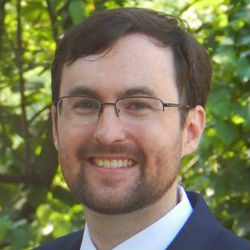 Patrick Galligan completed his MSI with a focus in Archives and Records Management from the University of Michigan in 2013. He is an Assistant Digital Archivist at the Rockefeller Archive Center. Patrick is the RAC's metadata wrangler, ArchivesSpace super user, and he takes the lead on EAD conversion projects. Since starting at the RAC he's acted as the go-to contact for tricky EAD and description issues, and has helped encode description for 75,000 archival objects. He oversaw the RAC's migration to ArchivesSpace from Archivists Toolkit, and is a member of the ArchivesSpace Technical Advisory Committee as well as the Integrations Subcommittee. He is also a member of the NYEAD project team that helps New York State cultural heritage institutions create and learn EAD. He loves using technology to try to find data-driven solutions to description and access questions.
Patrick Galligan completed his MSI with a focus in Archives and Records Management from the University of Michigan in 2013. He is an Assistant Digital Archivist at the Rockefeller Archive Center. Patrick is the RAC's metadata wrangler, ArchivesSpace super user, and he takes the lead on EAD conversion projects. Since starting at the RAC he's acted as the go-to contact for tricky EAD and description issues, and has helped encode description for 75,000 archival objects. He oversaw the RAC's migration to ArchivesSpace from Archivists Toolkit, and is a member of the ArchivesSpace Technical Advisory Committee as well as the Integrations Subcommittee. He is also a member of the NYEAD project team that helps New York State cultural heritage institutions create and learn EAD. He loves using technology to try to find data-driven solutions to description and access questions.
Besides its technical responsibility to work on improving the EAD tag library, I've always seen the EAD Roundtable's role as one of education and outreach. As a co-chair of the EAD Roundtable, I'd seek out opportunities to help educate those smaller institutions that have not had the formal, hands-on experience with EAD that many of us have, and to explore open-source tools to help them encode their first EAD finding aids. The wider adoption of EAD3 presents an exciting opportunity to offer sessions, webinars, or seminars aimed at helping those that do not have the technological background feel comfortable working with EAD. Besides educating people about how to create and use EAD, I think we also need to focus on the benefits of EAD, and how making machine-readable description can help any institution. Working with EAD shouldn't be scary, and, through education and outreach, I think we have the potential to demystify what some see as an extremely complicated. I'd love to help spread a greater understanding of EAD while serving as EAD Roundtable co-chair.
Archivist and Special Collections Librarian at CSU Long Beach
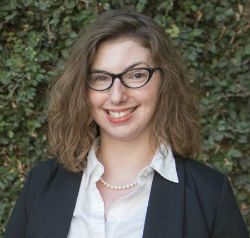 I graduated from San José State University with my MLIS in 2012, and I am now the Archivist and Special Collections Librarian at CSULB. This position is a new one, and I am the first professional librarian overseeing Special Collections & University Archives since 1989. The department has traditionally been very low-tech, which gives me the opportunity to start from scratch as I make our finding aids and other materials more accessible. One of our unique collections is our collection of CSULB syllabi. Over the past year and a half, I have been working to streamline our process for collecting syllabi, which I presented as a poster at iPRES 2015. I look forward to the future of metadata standards as Encoded Archival Description Roundtable transforms into the Encoded Archival Standards Roundtable.
I graduated from San José State University with my MLIS in 2012, and I am now the Archivist and Special Collections Librarian at CSULB. This position is a new one, and I am the first professional librarian overseeing Special Collections & University Archives since 1989. The department has traditionally been very low-tech, which gives me the opportunity to start from scratch as I make our finding aids and other materials more accessible. One of our unique collections is our collection of CSULB syllabi. Over the past year and a half, I have been working to streamline our process for collecting syllabi, which I presented as a poster at iPRES 2015. I look forward to the future of metadata standards as Encoded Archival Description Roundtable transforms into the Encoded Archival Standards Roundtable.
My focus during my MLIS was on Archives and Special Collections. I first became interested in Encoded Archival Description during a seminar on metadata, during which I wrote papers on the implementation of metadata schemas in archival repositories, as well as the structure and history of Encoded Archival Description specifically. Promoting the standardization of metadata among archival repositories goes a long way toward improving the accessibility of archival resources and increasing cooperation among archival institutions. For this reason I would be thrilled to work as co-chair of the Encoded Archival Description Roundtable Steering Committee.
Assistant Archivist for Metadata and Digital Projects at the Bentley Historical Library
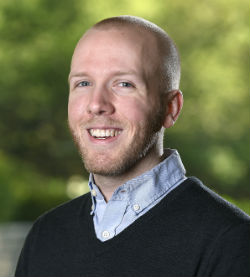 Dallas Pillen is the Assistant Archivist for Metadata and Digital Projects at the Bentley Historical Library where he has worked to migrate the Bentley's legacy metadata to ArchivesSpace; oversees its web archiving initiatives; contributes to the ArchivesSpace-Archivematica-DSpace Workflow Integration project; and assists with a variety of other projects involving born-digital and digitized materials at the library. He is a graduate of Wayne State University's School of Library and Information Science and previously worked for the Walter P. Reuther Library of Labor and Urban Affairs, the Detroit Historical Society, and the Detroit Jewish News Foundation.
Dallas Pillen is the Assistant Archivist for Metadata and Digital Projects at the Bentley Historical Library where he has worked to migrate the Bentley's legacy metadata to ArchivesSpace; oversees its web archiving initiatives; contributes to the ArchivesSpace-Archivematica-DSpace Workflow Integration project; and assists with a variety of other projects involving born-digital and digitized materials at the library. He is a graduate of Wayne State University's School of Library and Information Science and previously worked for the Walter P. Reuther Library of Labor and Urban Affairs, the Detroit Historical Society, and the Detroit Jewish News Foundation.
I have worked with EAD throughout my career, including spending the past year updating and refining the Bentley Historical Library's legacy EADs in preparation for migration to ArchivesSpace. Throughout the process, I have gained a great appreciation for the affordances of archival encoding standards and for the importance of groups such as the Encoded Archival Standards Roundtable in providing resources to and sharing knowledge with the wider archival community. With this group's transformation from the Encoded Archival Description Roundtable to the Encoded Archival Standards Roundtable, along with the emergence and wider adoption of new and updated standards and tools, the next several years will be an exciting and vital time for the group and, as co-chair, I would strive to ensure that the EAS RT is providing the most accessible and up-to-date tools, information, and other resources regarding the implementation, transformation, and dissemination of encoded archival information.
Project Archivist at the Bentley Historical Library
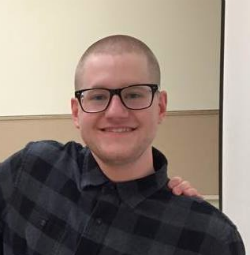 Devon Proudfoot is a Project Archivist at the University of Michigan's Bentley Historical Library. He is a 2016 graduate of the University of Michigan's School of Information, with a specialization in Archives and Records Management, and has previously worked as a processor at the Center for Archival Collections at Bowling Green State University and as a Curation Assistant at the Bentley Historical Library. Devon's work at the Bentley as a Project Archivist and as a student employee has included a comprehensive legacy EAD cleanup project, which involved reconciling multiple versions of finding aids and preparing EAD for migration to ArchivesSpace, in addition to processing archival collections, enhancing archival description to promote hidden collections, and assisting with the library's ArchivesSpace documentation.
Devon Proudfoot is a Project Archivist at the University of Michigan's Bentley Historical Library. He is a 2016 graduate of the University of Michigan's School of Information, with a specialization in Archives and Records Management, and has previously worked as a processor at the Center for Archival Collections at Bowling Green State University and as a Curation Assistant at the Bentley Historical Library. Devon's work at the Bentley as a Project Archivist and as a student employee has included a comprehensive legacy EAD cleanup project, which involved reconciling multiple versions of finding aids and preparing EAD for migration to ArchivesSpace, in addition to processing archival collections, enhancing archival description to promote hidden collections, and assisting with the library's ArchivesSpace documentation.
As a student employee at the Bentley Historical Library, I worked on a comprehensive legacy finding aid and EAD reconciliation and cleanup project to ensure consistency between various versions of the library's legacy description; to enhance and clean up the description where possible; and to prepare the Bentley's legacy EAD for migration to ArchivesSpace. Working on this project has given me an appreciation for encoded archival description and has educated me about how it can offer enhanced access to collections and interoperability between systems. My studies at the University of Michigan's School of Information also contributed to my knowledge of encoded archival standards, such as EAC-CPF, and about the benefits that those standards afford in terms of linked data. I am eager to learn more about encoded archival standards and to put my existing knowledge and interest to use as a member of this steering committee.
Archives Assistant at Yale University, Manuscripts and Archives
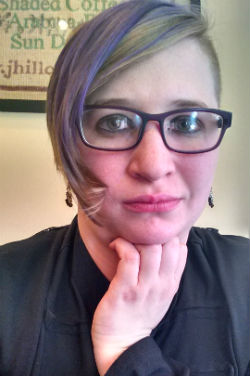 Christy Tomecek is an archives assistant at Yale University's Manuscripts and Archives. In this position, she works with baseline arrangement, top level and inventory level description, outreach, and local testing and training with the archival management system ArchivesSpace. She also has created screencasts on using ArchivesSpace for Lyrasis. She has worked in EAD 2002 outside of archival management systems in multiple positions during the process of creating finding aids. Previous positions include Assistant Archivist at the Armenian Church of America, Eastern Diocese, intern at the Oskar Diethelm Library at Weill Cornell Medical College, and archival technician at the Municipal Archives in New York, New York. She holds a MLS with an archives certificate from Queens College, City University of New York.
Christy Tomecek is an archives assistant at Yale University's Manuscripts and Archives. In this position, she works with baseline arrangement, top level and inventory level description, outreach, and local testing and training with the archival management system ArchivesSpace. She also has created screencasts on using ArchivesSpace for Lyrasis. She has worked in EAD 2002 outside of archival management systems in multiple positions during the process of creating finding aids. Previous positions include Assistant Archivist at the Armenian Church of America, Eastern Diocese, intern at the Oskar Diethelm Library at Weill Cornell Medical College, and archival technician at the Municipal Archives in New York, New York. She holds a MLS with an archives certificate from Queens College, City University of New York.
My professional interests have always been in descriptive practices, data standards and best practices, and linked data, so as to provide structure for a wider context topically and better access to archival materials. As a steering committee member, I would love to collaborate with others in the profession to provide education and training such as workshops and training guides to demystify and highlight the further possibilities of EAD3, such as flexibility for our description while simultaneously providing a coherent structure for discoverability. I would also like to provide talks, seminars, and other events that start and continue conversations exploring the interrelations made possible by EAD3, EAC-CPF, and any other standards that may be developed which could provide a more detailed range of relationships and events for researchers to form connections. I would be honored to join the steering committee to work towards these goals so as to enrich our considerations and practices for our description.